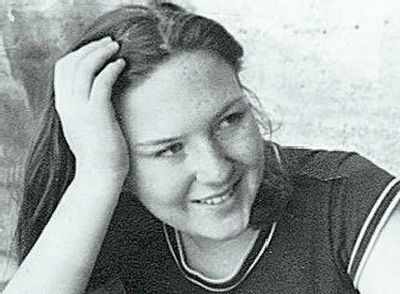‘Innocent Dream’ ended too soon

Those who knew Emma Howell are feeling a natural kind of conflict as they prepare for tonight’s reading of her book of poetry “Slim Night of Recognition.”
On the joyful side, they will be gathering to celebrate the book’s publication by Eastern Washington University Press.
At the extreme other end of the maze of feelings we call emotions, they will be grieving the loss of Howell, who died five years ago at the tender age of 20.
“It’s a double-edged thing, that’s true,” says Christopher Howell, much-published poet, a member of EWU’s creative writing faculty, senior editor at EWU Press … and Emma’s father.
The young Howell, who had been studying in Brazil, died in a swimming accident.
Long before that, she was carrying on the family tradition of putting words on paper. Besides her father being a writer (eight books of poetry and counting), her mother – Portland resident Karen Checkoway – is a writer, editor and book designer.
Two of her aunts work for college creative-writing programs, one at Princeton and the other at the University of Houston.
And her godfather, Checkoway’s husband, is the Portland-based poet Carlos Reyes.
“She had this terrific running start,” Christopher Howell says. “There were writers in and out of our house, and then when we separated out of my house and her mother’s house all the time. So either she had the writing gene or she picked it up.”
Or both. Any way you look at it, young Howell made the most of her time. She began reading in public at age 12, mixing in with far older poets at Portland’s Café Lena.
She also, as a high school sophomore, took classes from Henry Carlile – her father’s old professor – at Portland State University.
“It was just remarkable that she had the presence to do it,” Checkoway told Oregonian writer Margie Boul, “but also that her work was very good, even at that age.”
Two of the three poets who will read Howell’s poems tonight, EWU creative-writing faculty members Nance Van Winckel and Jonathan Johnson (the third will be Reyes), echo Checkoway’s opinion.
“I think one of the really special things about her work was how advanced it was for such a young person,” Van Winckel says. “She had a good sense of image and voice and all the things that usually take writers time to get command of.”
“Naturally, she was very talented and mature artistically for her age,” says Johnson. “But I also find the poems very spiritually wise. And that, for me, is the great gift of this book – the spiritual wisdom, the lesson in how to live with the time we have.”
Take, for example, these lines from the poem “His Animal’s Innocent Dream”:
I try to recognize myself in trees, but this green/
aches and wails an unheard-of song./
I know there is a word for this in my body/
or built into the ship I have become,/
but I’m leaving it all: the hand for searching, feet/
for when I get there, eyes for knowing which/
dark island is my own./
If you read closely, you’ll notice the other quality of Howell’s poetry: a seeming prescience.
“Several of the poems that she wrote in Brazil were about the sea,” Checkoway told Boulé. “They’re kind of eerie in the imagery of the ocean and being underwater.”
It was Howell’s father who took her notebooks and the computer she’d had with her in Brazil and labored to bring her work together as a book. In a way, hard as it was, editing “Slim Night of Recognition” allowed him to share a part of his daughter’s life that she had kept separate.
“She’d never shown any of it to me,” Howell says. “In fact, the first thing I saw of hers was a published poem in a magazine.
“I knew that she was doing it,” he adds, “and she would talk to me about writing kind of generally, theoretically, on a very sophisticated level. But she didn’t offer to show me the poems, and I didn’t ask to see them. I just knew it was happening. I didn’t want to push it. It just didn’t seem that it was my place to do that.”
Just as he doesn’t see it as his place to be one of tonight’s readers.
“I guess I didn’t want the occasion to be about me, at all,” Howell says. “And these were people who knew and who loved Emma, and so it seemed appropriate.”
One of those people, Johnson, isn’t just exaggerating when he equates the young Howell with English poet John Keats. And not just because both died young (Keats died at 25).
“The combination of mortal awareness and vitality was something that Emma shared with Keats,” Johnson says. “And also the way that their work reminds the rest of us to live attentively and to live with as much compassion and awareness of our existence as we can while we have it.”
That, then, is the joy amid grief. The poet is gone, but the work lives on.
“There were a lot of times when I was working on the book, going through her notebooks and so forth, that I really wondered whether or not I would continue,” Christopher Howell says.
“But it is kind of like she’s giving birth, you know? It’s kind of like the thing was my responsibility to do, to help her do that. And so the hope is, of course, that … the book will somehow help mitigate the loss.”